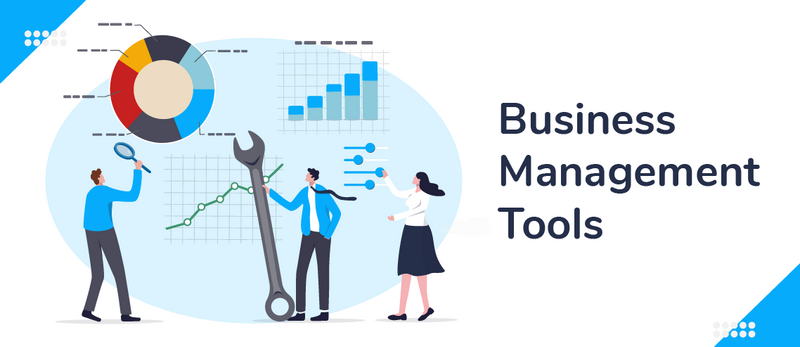Managing a small business can be difficult. Many tasks demand attention: finances, communication, marketing, and more. Luckily, there are many tools that can make this easier. These tools help small business owners save time, stay organized, and grow their businesses efficiently.
In this blog post, we will discuss some of the best small business management tools. These tools can help you streamline your operations and boost your productivity. Whether you’re a new entrepreneur or you’ve been running a business for years, the right tools can make a huge difference.
Why You Need Small Business Management Tools
Running a small business requires balancing many tasks. For example, you need to manage finances, interact with customers, and keep track of inventory. Without good tools, these tasks can become overwhelming.
Small business management tools are designed to solve this problem. They simplify complex tasks and help you stay on top of things. With the right tools, you can manage your business better and focus on what matters most.
Types of Small Business Management Tools

There are many different types of tools available. Some help you manage finances, while others focus on communication or project management. Here are a few types of tools that every small business owner should consider using:
1. Accounting and Finance Tools
Managing finances is one of the most important tasks for any business. You need to keep track of income, expenses, and taxes. Accounting tools make this easier.
Popular options:
- QuickBooks: QuickBooks is one of the most popular accounting tools. It helps you track income and expenses, generate invoices, and even pay taxes. It also integrates with your bank account, making it easy to manage cash flow.
- Xero: Xero is another excellent accounting tool. It offers features like invoicing, payroll, and financial reporting. Xero is known for being user-friendly, which makes it ideal for small business owners who are not accounting experts.
2. Project Management Tools
Managing projects efficiently is key to running a successful business. Project management tools help you organize tasks, set deadlines, and assign responsibilities.
Popular options:
- Trello: Trello is a simple project management tool that uses boards, lists, and cards. It’s perfect for small teams or solo entrepreneurs. You can create to-do lists, track progress, and collaborate with others in real-time.
- Asana: Asana is another great project management tool. It allows you to create tasks, set deadlines, and assign responsibilities. Asana helps keep everyone on the same page, making it easier to manage your business projects.
3. Customer Relationship Management (CRM) Tools
CRM tools are designed to help businesses manage customer relationships. They store customer information, track interactions, and help you provide better service.
Popular options:
- HubSpot: HubSpot is a free CRM tool that helps you manage customer relationships. It stores customer contact details, tracks communication history, and allows you to follow up with leads. HubSpot also has a range of marketing and sales tools that help you grow your business.
- Salesforce: Salesforce is a more advanced CRM tool that helps you manage leads, track sales, and analyze customer data. It offers a variety of customization options, making it suitable for businesses of all sizes.
4. Communication Tools
Clear communication is vital for running a small business. Communication tools help you stay in touch with your team, clients, and customers.
Popular options:
- Slack: Slack is a messaging app that makes team communication easier. You can create channels for different topics, share files, and message team members directly. Slack helps keep communication organized and reduces the need for lengthy email threads.
- Zoom: Zoom is a video conferencing tool. It allows you to have virtual meetings with team members, clients, or customers. Zoom is particularly useful if you work with remote teams or clients in different locations.
5. Time Management Tools
Time is money. If you don’t manage your time well, it can hurt your business. Time management tools help you stay focused and productive throughout the day.
Popular options:
- Toggl: Toggl is a simple time-tracking tool. It helps you track how much time you spend on different tasks. This is useful for understanding where your time is going and finding ways to improve efficiency.
- RescueTime: RescueTime tracks the time you spend on your computer and mobile devices. It helps you identify time-wasting habits and stay focused on important tasks.
6. Inventory Management Tools
If you sell physical products, keeping track of inventory is essential. Inventory management tools help you monitor stock levels, track sales, and reorder products when necessary.
Popular options:
- TradeGecko: TradeGecko is a powerful inventory management tool. It helps you manage stock, track orders, and generate reports. TradeGecko integrates with your online store, making it easy to manage your products.
- Zoho Inventory: Zoho Inventory is another great option for managing inventory. It allows you to track stock levels, manage orders, and generate invoices. Zoho Inventory also integrates with accounting software, making it easy to keep your finances in check.
7. Marketing Tools
Marketing is essential for growing your small business. Marketing tools help you reach new customers, manage social media, and create campaigns.
Popular options:
- Mailchimp: Mailchimp is a popular email marketing tool. It helps you create and send newsletters, manage your email lists, and track performance. Mailchimp also offers automation features, making it easier to stay in touch with customers.
- Hootsuite: Hootsuite is a social media management tool. It allows you to schedule posts, track mentions, and analyze your social media performance. Hootsuite helps you manage multiple social media accounts from one platform.
8. Human Resources (HR) Tools
Managing your team is crucial to your business’s success. HR tools help you with tasks like hiring, onboarding, payroll, and performance tracking.
Popular options:
- Gusto: Gusto is an all-in-one HR tool that simplifies payroll, benefits, and compliance. It’s designed for small businesses and can help you manage employee records, process payments, and file taxes. Gusto also offers tools for hiring and onboarding new employees.
- BambooHR: BambooHR is a great tool for managing employee data. It helps you track personal information, vacation days, and performance reviews. BambooHR also offers features for recruiting, employee self-service, and reporting.
9. Document Management Tools
Managing documents is an important part of running a small business. Document management tools help you store, organize, and share documents securely.
Popular options:
- Google Drive: Google Drive is a cloud-based storage tool that allows you to store files and share them with others. You can also create and edit documents, spreadsheets, and presentations with Google’s suite of apps.
- Dropbox: Dropbox is another cloud storage tool that helps you store and share files. It offers easy file syncing and sharing, making it a popular choice for businesses. Dropbox also integrates with other tools, such as Slack and Zoom.
10. Website Management Tools
Your website is often the first thing customers see when they interact with your business. Website management tools help you build, maintain, and improve your website.
Popular options:
- WordPress: WordPress is a popular website-building platform. It’s easy to use and offers a wide range of themes and plugins. Whether you need a simple blog or a full-fledged e-commerce store, WordPress can help you create a professional website.
- Wix: Wix is another website-building tool. It offers drag-and-drop functionality, making it easy to create a website without any coding experience. Wix also provides a variety of templates and apps to enhance your site.
11. Email Marketing Tools
Email marketing is one of the most effective ways to communicate with your customers. Email marketing tools help you create, send, and track email campaigns.
Popular options:
- ConvertKit: ConvertKit is an email marketing tool designed for small businesses and creators. It allows you to build email lists, create automated campaigns, and track results. ConvertKit also offers landing pages and forms to help you capture leads.
- SendinBlue: SendinBlue is an email marketing platform that offers email campaigns, marketing automation, and SMS marketing. It’s easy to use and provides detailed analytics to help you improve your campaigns.
12. Task Management Tools
Task management is another critical aspect of business operations. Task management tools help you stay organized and ensure important tasks don’t fall through the cracks.
Popular options:
- Todoist: Todoist is a task management tool that allows you to create to-do lists, set deadlines, and prioritize tasks. It’s easy to use and perfect for small business owners who want to stay organized.
- Microsoft To Do: Microsoft To Do is another simple task management tool. It integrates with other Microsoft tools, making it a good option for businesses that already use Microsoft 365. You can create tasks, set reminders, and collaborate with others on projects.
How to Choose the Right Small Business Management Tools

With so many options available, choosing the right tools for your business can feel overwhelming. Here are a few tips to help you make the best choice:
- Identify Your Needs: Think about what your business needs the most. Do you struggle with managing finances? Or do you need help with team communication? By identifying your main pain points, you can choose the tools that address those needs.
- Ease of Use: Look for tools that are easy to use. As a small business owner, you likely don’t have time to learn complicated software. Choose tools that are intuitive and user-friendly.
- Integration with Other Tools: Many tools integrate with each other. For example, you might want your project management tool to integrate with your calendar or your accounting software to connect with your invoicing tool. Ensure that the tools you choose can work together smoothly.
- Customer Support: It’s important to choose tools with good customer support. If you encounter any issues, you want to know that help is available. Look for tools that offer 24/7 support or live chat.
- Scalability: Your business will likely grow over time. Choose tools that can grow with your business. Look for tools that offer scalable plans or additional features as your needs change.
- Budget: Finally, consider your budget. Some tools offer free versions, while others require a subscription. Make sure the tools you choose fit within your budget, but don’t be afraid to invest in tools that will help you grow your business in the long run.
How Small Business Management Tools Can Help You Save Time
One of the biggest advantages of using small business management tools is the amount of time you can save. Here’s how these tools can help you be more efficient:
- Automation: Many tools offer automation features. For example, you can automate email marketing campaigns, schedule social media posts, or send invoices automatically. This saves you time and ensures tasks are done consistently.
- Better Organization: Tools like project management software and task managers help you stay organized. You can track deadlines, assign responsibilities, and monitor progress in real time. This reduces the chance of tasks falling behind or getting forgotten.
- Increased Collaboration: Communication tools like Slack and Zoom help you stay connected with your team, no matter where they are. This promotes collaboration and ensures that everyone is on the same page, making work more efficient.
Benefits of Using Small Business Management Tools

Using the right small business management tools offers several benefits that can greatly improve your operations. Let’s explore some of the key advantages:
1. Increased Productivity
One of the main benefits of using management tools is the boost in productivity. Instead of juggling multiple tasks manually, you can automate many processes. For example, accounting tools can automatically generate financial reports, while project management tools help keep tasks organized. By reducing the time spent on repetitive tasks, you free up time to focus on more important activities, like growing your business.
2. Improved Decision-Making
Small business management tools often come with built-in analytics and reporting features. These tools collect data from various aspects of your business—sales, marketing, finances—and present it in a way that’s easy to understand. With this information, you can make better, more informed decisions about your business strategy.
For example, if your inventory management tool shows that a particular product is selling well, you can decide to reorder more stock. Similarly, by tracking your marketing campaigns, you can identify which strategies work best and allocate your budget accordingly.
3. Better Customer Service
Customer satisfaction is essential for any small business. Management tools like CRMs help you track customer interactions and provide personalized service. By having all your customer data in one place, you can quickly respond to inquiries, resolve issues, and follow up on leads. This leads to improved customer satisfaction and loyalty.
Communication tools also play a role in customer service. For example, Slack can be used to create dedicated channels for customer support teams, making it easier to collaborate and provide fast responses to customers.
4. Cost Savings
Small business management tools help save money by improving efficiency and reducing the chances of errors. Instead of hiring additional employees for tasks like accounting or project management, you can use tools to handle these tasks. Additionally, these tools can help prevent costly mistakes—like missing deadlines or forgetting important tasks—that could harm your bottom line.
Tools like QuickBooks and Xero also reduce the need for a dedicated accountant. They allow you to manage your finances without professional expertise, saving you money on hiring external services.
5. Streamlined Communication
Good communication is key to running a successful business. Whether you’re talking to employees, suppliers, or customers, effective communication helps keep things running smoothly. Communication tools like Slack and Zoom ensure that you and your team can collaborate easily, even if you work remotely. This reduces misunderstandings and delays, helping your business stay on track.
For example, using Zoom for regular team meetings can help align everyone on project goals and timelines, while Slack can facilitate quick chats and file sharing throughout the day. This makes the entire communication process more efficient.
How to Implement Small Business Management Tools Successfully
Once you’ve chosen the right tools for your business, it’s important to implement them correctly. Here are some tips to help you make the most of your chosen tools:
1. Train Your Team
Even if a tool is easy to use, your team will need some training to understand how it works and how to make the most of it. Make sure to provide adequate training for your team, especially if the tools involve complex features. Many tools offer tutorials, webinars, and customer support to help you get started.
2. Start with One Tool at a Time
It can be tempting to adopt a wide range of tools at once, but this can be overwhelming. Instead, start with one tool, like a project management tool, and get used to it before adding another tool. Once your team is comfortable with one tool, you can gradually introduce others.
3. Evaluate Your Tools Regularly
Your business needs will change over time, so it’s important to evaluate your tools regularly. Are they still meeting your needs? Are there new tools that might be more efficient or cost-effective? Regularly reviewing your tools will help you stay up to date and ensure you’re using the best solutions for your business.
4. Use Integrations to Your Advantage
Many small business management tools offer integrations with other software. Take advantage of these integrations to streamline your workflow. For example, if your accounting software integrates with your inventory management tool, you can easily track sales and expenses without manually updating both systems.
5. Seek Customer Support When Needed
If you encounter any issues with your tools, don’t hesitate to reach out to customer support. Most tools offer robust support systems, including live chat, email, and phone support. Whether you’re facing a technical problem or need advice on how to use a feature, customer support can help guide you through the process.
Conclusion
Running a small business is challenging, but with the right management tools, you can simplify many aspects of your operations. Tools for accounting, project management, customer relationship management, and more can save you time, improve productivity, and help you grow your business.
The key is to find tools that align with your business needs and integrate smoothly into your existing workflows. Start by identifying your top pain points, then explore the tools that can solve them. Over time, as your business grows, you can add more tools and adjust your workflow for even greater efficiency.
By leveraging the right small business management tools, you can focus more on what matters most: building your business, serving your customers, and achieving your goals.
Remember, the right tools can make all the difference in your business’s success. Start small, stay organized, and gradually expand your toolkit as your needs evolve. With the right combination of tools, your business will be equipped for growth and success.
Frequently Asked Questions (FAQ)
1. What are the most important small business management tools?
The most important small business management tools depend on your specific needs. However, some of the most widely used tools include:
Accounting tools like QuickBooks or Xero for managing finances.
Project management tools like Trello or Asana for organizing tasks and projects.
CRM tools like HubSpot or Salesforce for managing customer relationships.
Communication tools like Slack or Zoom to improve team collaboration and communication.
2. How do small business management tools help save time?
Small business management tools save time by automating repetitive tasks, keeping everything organized, and making it easier to manage multiple aspects of your business. For example, accounting tools automate invoicing and tax calculations, while project management tools keep tasks organized and track progress. These features help you avoid spending too much time on manual work, allowing you to focus on growing your business.
3. Are small business management tools easy to use?
Yes, most small business management tools are designed to be user-friendly. They offer simple interfaces, and many come with tutorials or customer support to help you get started. While some tools may have more advanced features, they generally allow you to start with basic functions and expand as you become more comfortable.
4. How do I choose the right small business management tool?
To choose the right tools, consider your business’s specific needs. Think about the tasks you struggle with the most, whether it’s accounting, communication, or project management. Look for tools that offer the features you need, are easy to use, integrate with other software you already use, and fit your budget. You may also want to try out free trials to see how the tools work in practice before committing.
5. Can I use multiple small business management tools at once?
Yes, you can use multiple small business management tools at the same time. Many businesses use a combination of tools to cover different areas, such as accounting, project management, and customer communication. The key is to ensure that the tools integrate well with each other, so






1 Comment